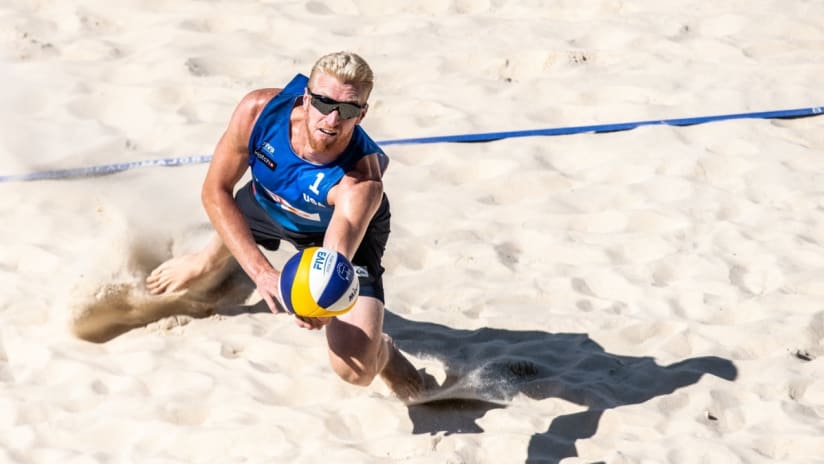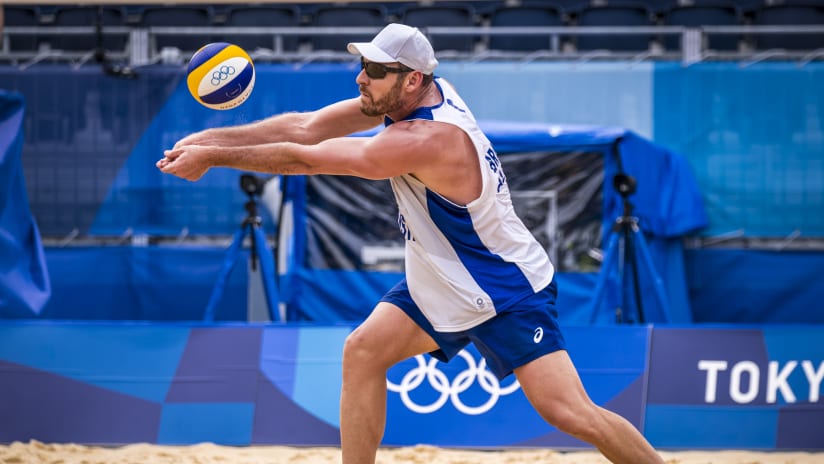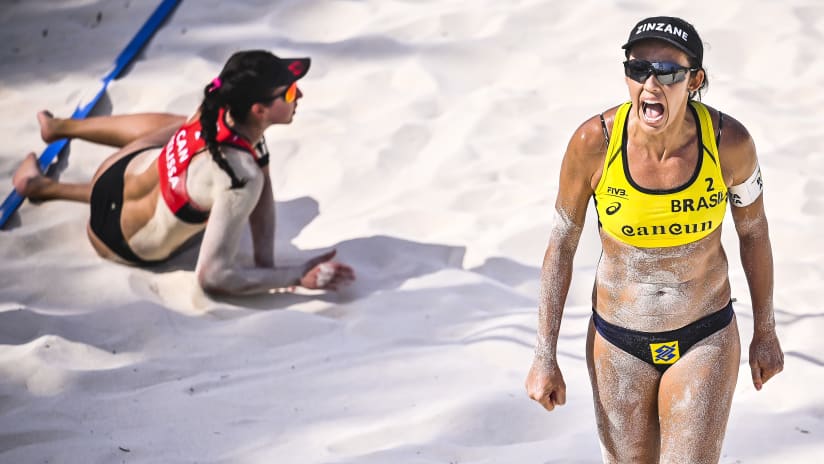On January 31, Betsi Flint was not supposed to be standing. And she was absolutely, positively, not supposed to be standing on one leg.
Betsi Flint's post-pregnancy career beginning with a new sense of focus
In January, Flint gave birth to her daughter, Cora. She's already back and dominating on the AVP and FIVB
Published 09:42, 04 Nov 2021
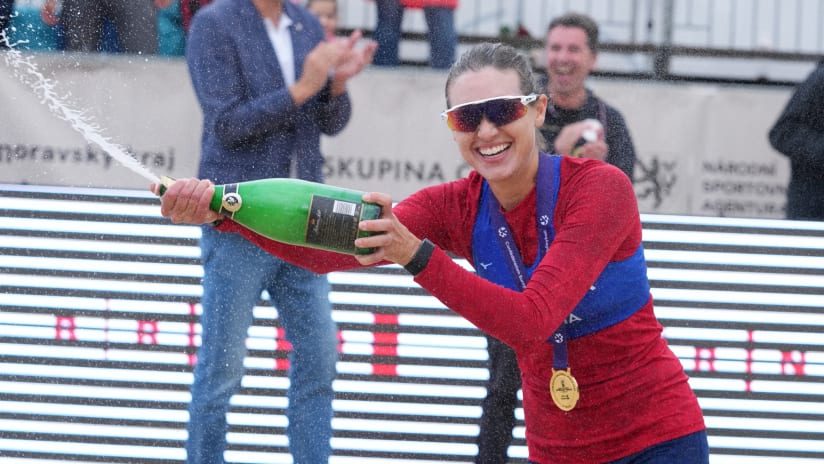
Yet there she was, just a few hours after giving birth to her daughter, Cora, balancing on one leg while sliding sweatpants over the other.
“You need to sit down to do that,” an astonished midwife told her. “You’re not supposed to be standing on one leg!’”
To which Flint replied: “Well, I can. I think I got it.”
Because this wasn’t any ordinary mother giving birth.
This was Betsi Flint.
Pregnancy for female athletes will always be a tricky matter for a lengthy list of mostly obvious reasons. There is the timing of the pregnancy, which Flint did exceptionally well – she missed the 2020 season that essentially never happened due to COVID – and the looming question of how the athlete will respond after giving birth, both mentally and physically.
There are the Kerri Walsh Jennings and Laura Ludwigs of the world, superwomen who gave birth and won gold medals on the sport’s biggest stages in the wake of having a child – Walsh Jennings won gold while pregnant in the 2012 Olympics, Ludwig won gold at the 2019 World Tour Finals one year after giving birth to her son, Teo.
Then there are others who find their competitive fire has been dashed or dwindled, and suddenly traveling the world, spending time away from a family with an additional member no longer holds the weight it once did.
Flint, despite being specifically encouraged to not compare herself to Walsh Jennings, belongs firmly in the camp of the four-time Olympic medallist in terms of how she returned from pregnancy.
“I always wanted to go out on the sand and get better but now it feels more purposeful,” said Flint, who is 29 years old. “If I’m going to be taking this time away from her, I’m going to make sure I take advantage of it and I’m going to get better and I’m going to have fun doing it.”
She’s quiet, Flint, yet under that introverted exterior is a simmering, white-hot competitive fire. Take the scene in the birth centre’s office as an example. Was she supposed to be standing on one leg, putting sweatpants on, walking on her own? Absolutely not.
Did she do it anyway? Absolutely.
Because she’s Betsi Flint.
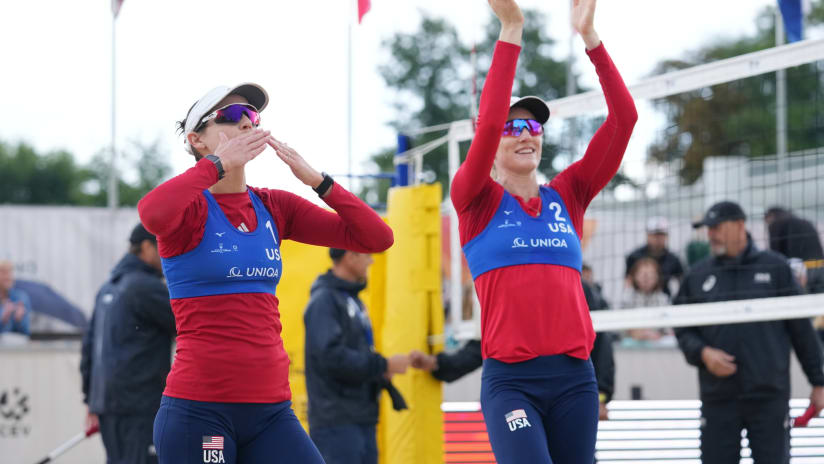
She knows herself, too. Knows she probably would have at least attempted to rush back, begun practising too soon, training too soon. Which is why it was crucial that she had essentially three layers of people keeping her in check.
About a week after having Cora, Flint wanted to go for a long walk to stretch the legs. Her husband, Chase, a former basketball player at Loyola Marymount, where Flint was a standout on the beach volleyball team, reminded her that “You told me you’d wait at least a week and a half. We’re not leaving the house,” Flint recalled. “I was so mad. But it was helpful to have people hold me back a little bit, so when I felt ready, I could get after it.”
Six weeks later, she had a similar conversation with her physical therapist.
“I said ‘Alright, I can go jump and do whatever I want!’” Flint said, laughing. “Then I saw my physical therapist and she said ‘No, not for a couple weeks.’ That was really helpful for her to hold me back a little bit. She knew how much I wanted it and it wasn’t worth to do too much now. I listened to people. It was helpful to have people telling me what to do.”
It was helpful to have people hold me back a little bit, so when I felt ready, I could get after it. Betsi Flint
It still didn’t ease the restlessness. When she was atlast allowed back on the beach, it wasn’t her partner, Emily Day, or her coach, John Mayer, she called, but a few of her neighbours. She couldn’t have Day and Mayer see the many layers of rust that might be there.
But her neighbours?
That's a no judgement zone.
“Even if you take a couple weeks off, you feel like you haven’t played in forever,” Flint said. “Taking that much time off is really hard.”
And yet, despite taking all that time off, despite seeing her body change in ways it never had, despite taking on an entirely new – and wonderful – life role as a mother, Flint enjoyed one of the finest, if not brief, seasons of her career. Her and Day picked up right where they left off, taking fifth in their second event back, an AVP in Atlanta, before making the finals of the AVP Manhattan Beach Open. A week later, they won gold at a two-star FIVB Beach Volleyball World Tour event in Brno, Czech Republic, losing only a single set in the process.
“I was like ‘Oh my gosh, what have I been doing for the past year? You come back like this, did I get any better?’” Day said. “It’s so impressive. She worked so hard during her pregnancy to keep herself in shape.”
Indeed, Flint became a model of how to stay as fit as possible while simultaneously growing a human being, her Instagram becoming a months-long advertisement for a weight programme for expecting mothers called Expecting and Empowered. There she was, deadlifting in her neighbour’s garage, pumping out air squats and goblet squats and dumbbell snatches, globular belly and all.
“She’s brutally competitive,” Day said, which she meant in the most flattering of ways. “When she puts her mind to something, she gets it done. Obviously she had a whole new responsibility with Cora but she was able to get in her workouts and bounce back so fast and in a healthy way in terms of not being injured.”
If 2020 and the first half of 2021 was a different year for Flint, it was an odd one for Day as well. For two seasons they had played together, winning consecutive AVPs in 2018 – in Seattle and San Francisco – as well as an FIVB in Haiyang, China. In 2019, they won a massive AVP in Hermosa Beach and made the finals in Chicago.
Yet life off the sand goes on, and it was time for Flint to start a family.
“When Betsi got pregnant, of course I was very happy for her. She’s starting a family and I knew her and Chase were going to be great parents,” Day said. “But the volleyball side, I was like ‘Oh, crap! I gotta find a partner.’”
She found one in Sara Hughes, an excellent defender who had been in partner limbo since a back injury derailed her Olympic quad with Summer Ross. But it wasn’t the same without Flint. Day and Hughes fell in five straight brutal country quota matches and lost both matches of pool play in Gstaad. A gold medal at the Rubavu, Rwanda two-star was a tremendous result, but both Day and Hughes knew it was time to be looking elsewhere.
It just so happened to be the exact time Flint was prepared to return to the beach.
“I was fortunate enough that Betsi came back super fast, but we didn’t know how she would be after having a child: priorities and your life is totally different,” Day said. “I couldn’t rely on the fact that Betsi was going to be back this year, at this date. Plus I didn’t want to push her to get back early and then she gets hurt or something like that. I was super concerned about that.
“When she decided to start a family, I had to look for another partner, and I knew that there were lots of good options so I just focused on what I could do with this other opportunity playing with Sara, and the timing just kind of worked out. When Betsi was ready to play, I was looking for a new partner. The timing worked out. It was great.”
It couldn’t have happened any other way that Flint’s first tournament back was an AVP Next Gold in Atlantic City, New Jersey, where she played five matches in a single day.
Five.
Less than six months after giving birth.
If I’m going to be taking this time away from her, I’m going to make sure I take advantage of it and I’m going to get better and I’m going to have fun doing it. Betsi Flint
“I almost died,” said Day, who is one of the fittest players on the AVP Tour. “I was like ‘Betsi! How are you still standing?’”
For the same reason that she was able to slip on sweatpants just a few hours after giving birth: Because she’s Betsi Flint.
“I’m not a patient person, so it’s really hard to go through that,” Flint said of the process of regaining the strength and touch she had prior to pregnancy. “You have these expectations for yourself and where you want to be, and you don’t want to go below that.”
She never did. Not by any external standards, anyway. She’s harder on herself than anybody else will be, which is perhaps why she’s as good as she is, why she has been able to recover the way she has.
One tournament remains on the calendar this season: The Itapema four-star, where Flint and Day are currently seeded sixth in the main draw.
“I want to win for sure,” Flint said. “It’s still going to be tough. We’re not just going to go and have fun. We want to win. It’s a great opportunity with a lot of teams not going. We’re going to take advantage of our opportunity and get after it.”

